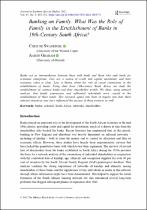| dc.contributor.author | Swanepoel, Christie | |
| dc.contributor.author | Graham, Aaron | |
| dc.date.accessioned | 2022-06-14T08:05:01Z | |
| dc.date.available | 2022-06-14T08:05:01Z | |
| dc.date.issued | 2021 | |
| dc.identifier.citation | Swanepoel, C., & Graham, A. (2021). Banking on family: What was the role of family in the establishment of banks in 19th-century South Africa?. Journal of Southern African Studies, 47(3), 455–472. https://doi.org/10.1080/03057070.2021.1903773 | en_US |
| dc.identifier.issn | 1465-3893 | |
| dc.identifier.uri | https://doi.org/10.1080/03057070.2021.1903773 | |
| dc.identifier.uri | http://hdl.handle.net/10566/7517 | |
| dc.description.abstract | Banks act as intermediaries between those with funds and those who seek funds for
economic enterprises. They are a source of credit and capital investment, and their
economic value is clear. Less is known about the role of social connections in the
establishment of banks. Using data from 19th-century South Africa, we study the
establishment of colonial banks and their shareholder profile. We show, using network
analysis, that family connections and influential individuals were crucial to the
establishment of these banks. This research opens new lines of inquiry into how these
network structures may have influenced the success of these ventures as well. | en_US |
| dc.language.iso | en | en_US |
| dc.publisher | Routledge | en_US |
| dc.subject | Banks | en_US |
| dc.subject | Colonial | en_US |
| dc.subject | Networks | en_US |
| dc.subject | Shareholders | en_US |
| dc.subject | South Africa | en_US |
| dc.title | Banking on family: What was the role of family in the establishment of banks in 19th-century South Africa? | en_US |
| dc.type | Article | en_US |

